Other Channel Types
Marketplace
For integration with the marketplace from Omnitron, there are certain operations that must take place such as reconciliation processes, mapping of attributes, etc. As in every marketplace, there are two different roles. One is the marketplace, and the other is the supplier;
Marketplace can sell its own products through any channel, as well as the products of all suppliers in reconciliation, through this platform.
Supplier can sell their own products through any channel, as well as through the marketplaces, in reconciliation and as channels. In other words, a company providing the marketplace system through the Omnitron does not prevent the sale of its own products and does not cause any problems for the supplier either.
Model Structure
We can discuss this section under two items; marketplace and supplier. For the marketplace, an order is created using a model derived from Order, called Vendor Order. This allows us to distinguish orders. (omnitron.orders.models.VendorOrder)
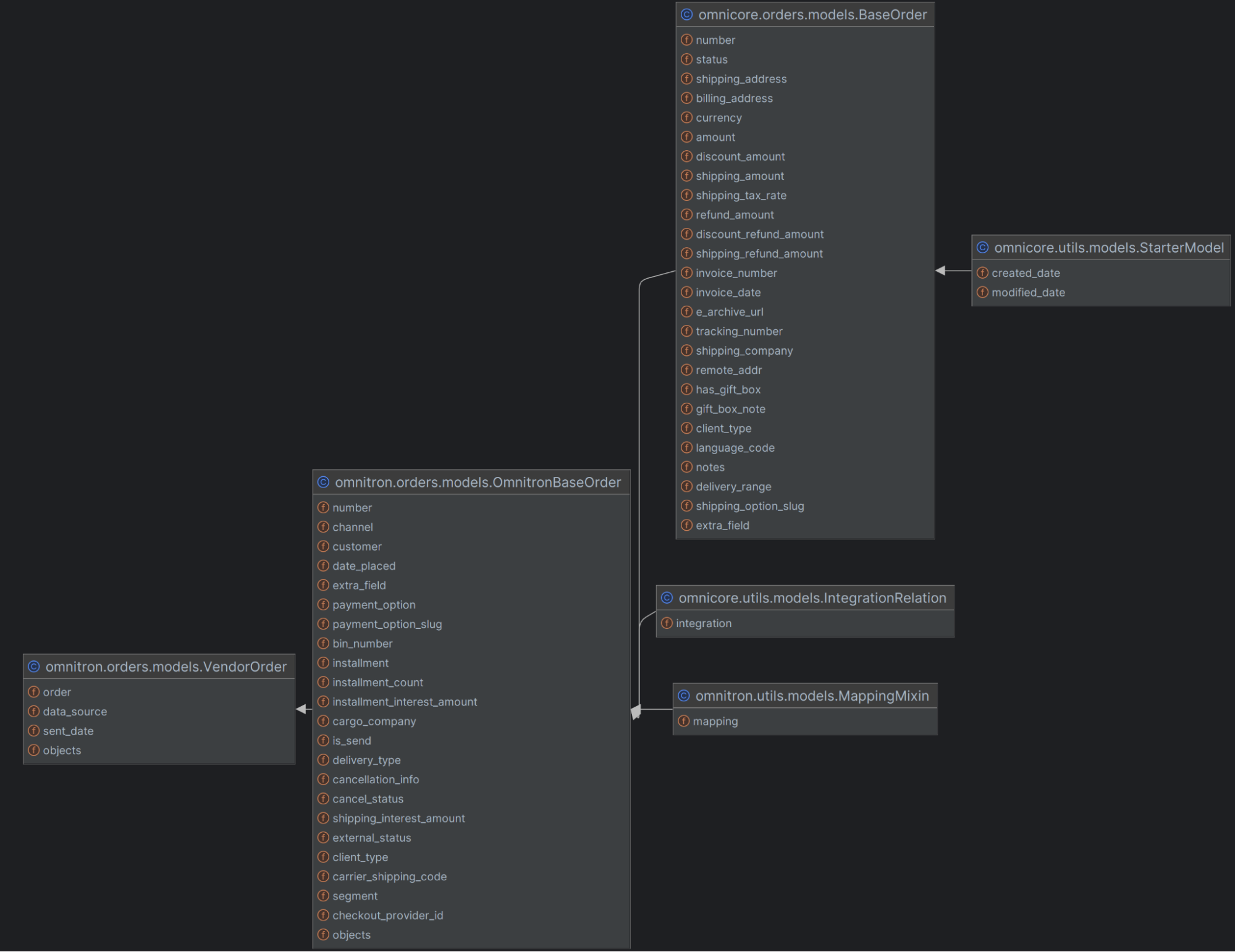
Figure 1: VendorOrder Model Fields and Inheritance
For the supplier, an order is created using the Order model without any differences from normal order. (omnitron.orders.models.Order)
Data Source is the model name of the digital contract. Contains name, stock_list, price_list, is_active, commission_rate, maturity_rate, token, conf and supplier_code.
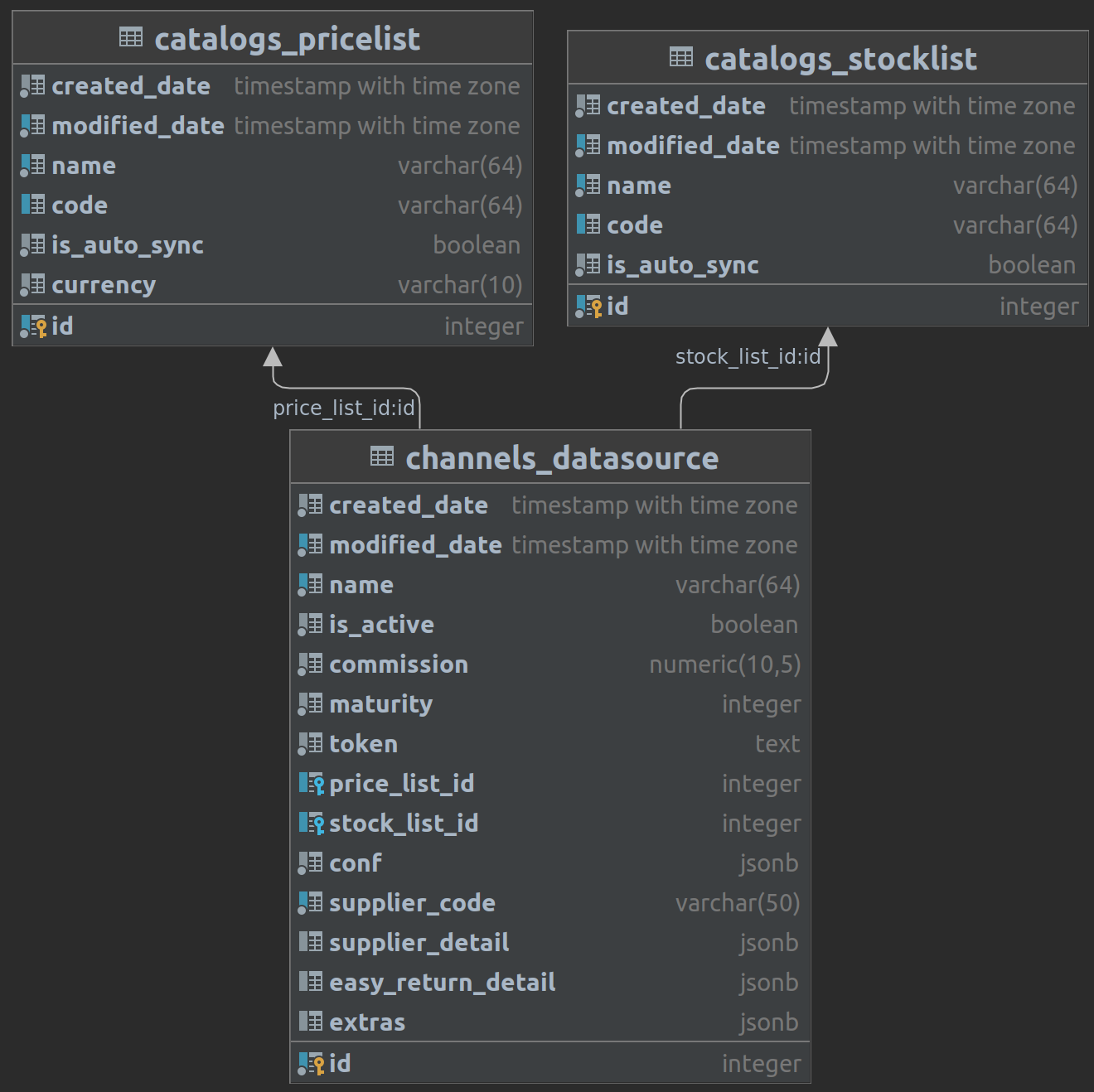
Figure 2: DataSource Model it’s Relations
Reconciliation is the model name of the reconciliation previously referred to. Contains data_source, channel, start_date, end_date, status, creation_type(automatic or manuel), item_selection_type(orderitem or orderitem and cancellation),number, name, total_income, total_expanse, total_commission, commission, maturity and conf. When the necessary contexts are provided through the frontend, the relevant record is created.
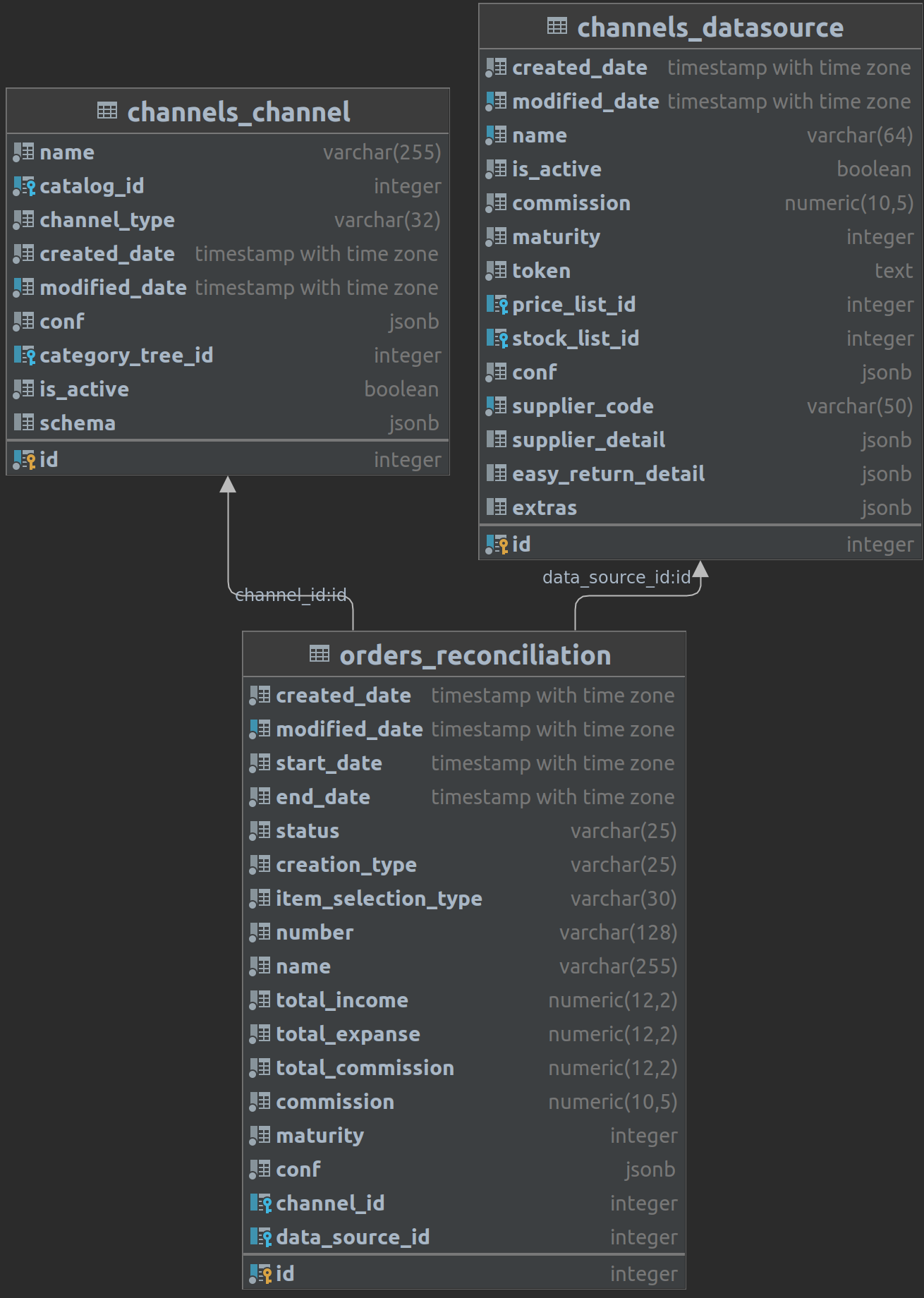
Figure 3: Reconciliation Model it’s Relations
VendorOrder; An Order model unlike the normal Order is created and linked with this model inherited from the Order with a foreignkey (order). data_source and sent_date are also in this model.
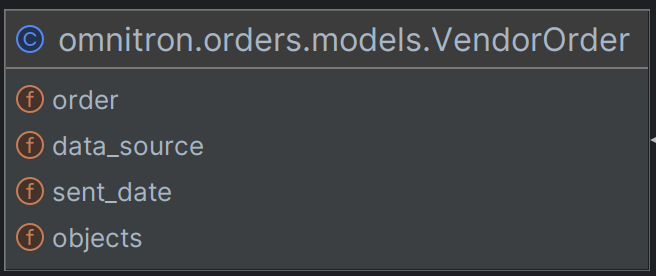
Figure 4: Fields only in VendorOrder
VendorOrderItem; Inherited from OrderItem. And the order foreign key is linked directly as VendorOrder. As in VendorOrder, the OrderItem model is created and linked with the model with a foreignkey (base).
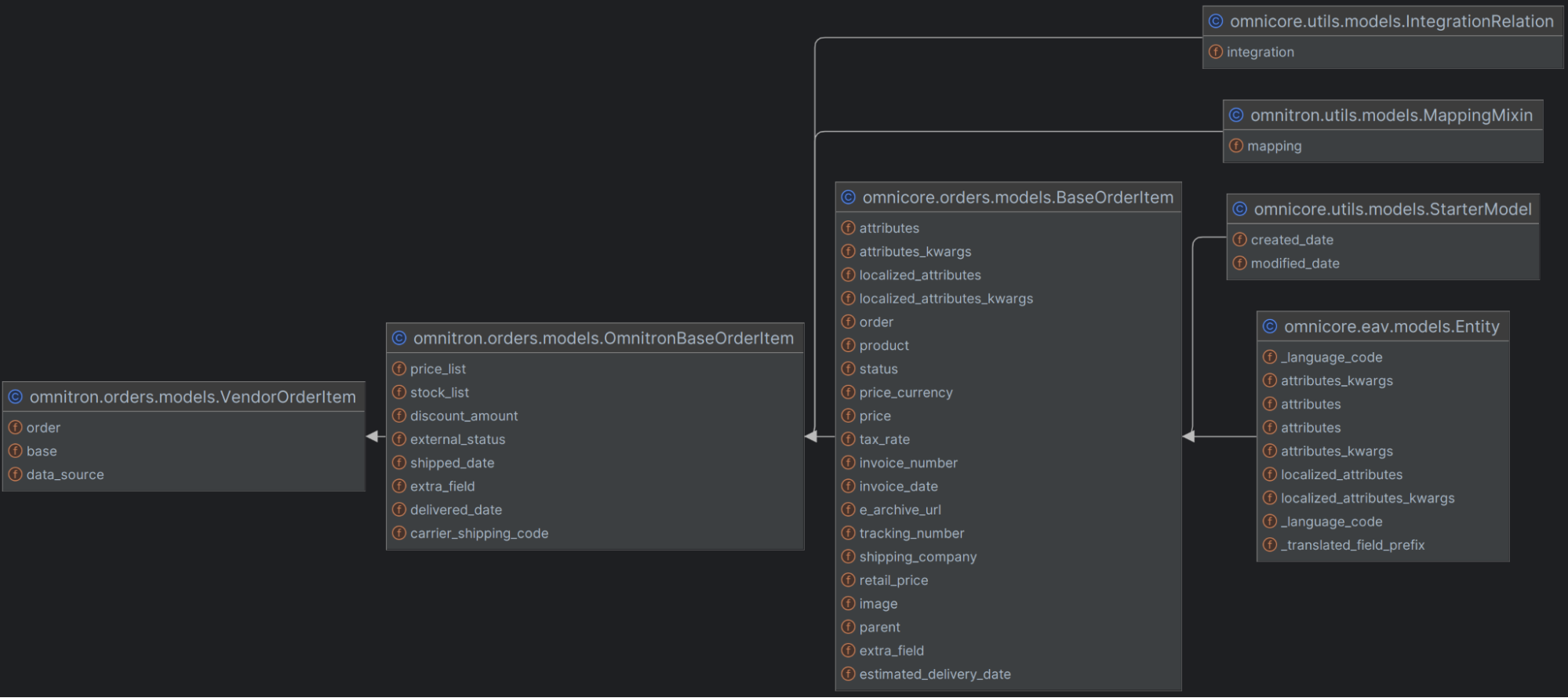
Figure 5: VendorOrderItem Model Fields and Inheritance
Script
After providing the attribute mapping that needs to be entered for the supplier from the marketplace Omnitron, the contract must be created from the Unified Digital Contract screen of the Unified Network menu from the marketplace Omnitron.
{
"reconciliation_conf":{
"data_source_name":"AD",
"item_selection_strategy":{
"days_later":6,
"strategy_type":"delivered_date"
},
"commission":"10.00000",
"maturity":90,
"creation_strategy":{
"day_of_week":2,
"strategy_type":"weekly"
},
"creation_strategy_change_date":"2020-02-10 16:06:19.979257+00:00"
}
}
If the supplier is from Omnitron, the channel type must be created by selecting Unified on the Sales Channels screen accessed from the Settings menu. When unified is selected, the input field will open for entering the unified digital contract key. The API key value provided when creating the digital contract from the Marketplace Omnitron must be entered in this input field.
Conf. example of the relevant channel,
{
"token": "<marketplace token>",
"server": "http://<marketplace_url>",
"shipping_company": "ups"
}
The user must wait for 10-15 minutes after these operations. Meanwhile, the digital contract process begins. The process is completed with the execution of the relevant tasks.
Service
VendorOrderService
(omnitron.orders.service.VendorOrderService)
create_order: The method used to create vendor orders.
number,channelanddata_sourceperform existence checks and create the vendor order.update_order: sends the
old_status,old_cancel_statusandold_external_statusvalues to audit context for recording the statuses. If the status update has been sent to the relevant method, it is sent to the order items withupdate_order_iteminVendorOrderItemService, and then toupdate_order_iteminOrderItemService. Finally, what needs to be updated in order is updated and saved.order_status_update: After controlling whether there are active items of
order, if there is none,is_refundis controlled and theorder statusvalue is updated asrefundedifis_refundTrue, and ascancelledif not. If there are active items, we advance the process by adding the status value of the active OrderItem.reject_order_cancel: As in
update_order, it is sent to the audit context for recording the statuses. Then we send the order linked to the vendor order toreject_order_cancelinOrderService. We follow this withorder_status_update.approved_order_cancel: As in
update_order, it is sent to the audit context for recording the statuses.Cancellation_infocontrol is made; if there is none,cancellation_infois added, if there is any, the approving party is entered. If this party isdata_source, operations such as addinginvoice_numberare carried out. If ERP, it is sent toapproved_order_cancelinOrderService. It is then sent toorder_status_update.cancel_order: Here, we first collect the reasons in the order that is linked to the vendor order; then, we send the order linked to the vendor order to
cancel_orderinOrderService.
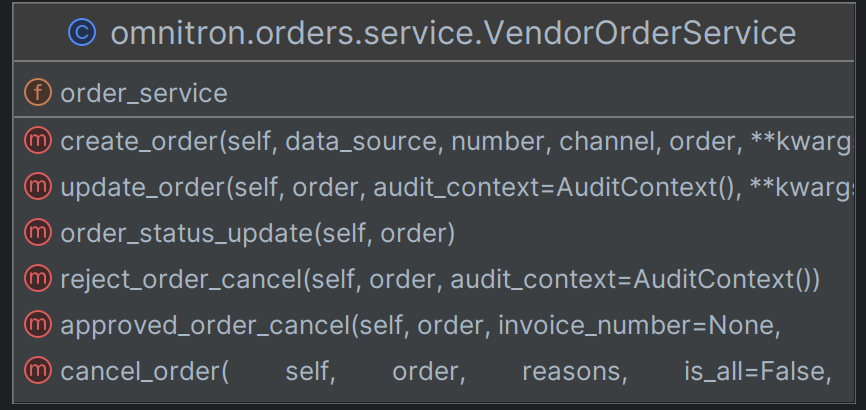
Figure 6: VendorOrderService Methods
VendorOrderItemService
(omnitron.orders.service.VendorOrderItemService)
create_order_item: A method that allows to create vendor order items.
update_order_item: Sends the order item linked to the vendor order item to
update_order_iteminOrderItemService.bulk_update_order_item: Puts through serializer for update and sends to
update_order_item_with_base.update_order_item_with_base: First, it sends the order item linked to the vendor order item to
update_order_iteminOrderItemService. It then checks thatretail_storeinshipping_addressand the order.status value are delivered, and sends toupdate_base_order_item.update_base_order_item: Collects certain data and sends the order item linked to the vendor order item to
update_order_iteminOrderItemService.update_order_item_send_stock: Sends the product_stock value in
stock_listlinked toorder_itemtoupdate_sold_quantity_reportedmethod inProductStockService.send_shipping_info: Sends the order item linked to the vendor order item to
send_shipping_infoinOrderItemService.
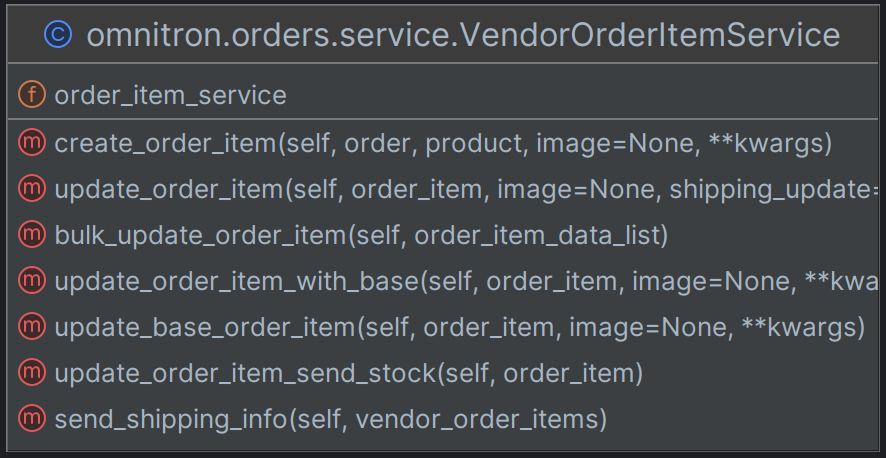
Figure 7: VendorOrderItemService Methods
Channel Tasks
All tasks are in omnitron.channels.integrations.akinon.tasks. As in other channels, there is data that the supplier needs to send. Tasks such as providing price & stock information, sending products, picking orders, etc. are located here.
Commands are located on serializer_class in omnitron.channels.integrations.akinon.integration.Integration.
These are:
InsertProduct: Throws a post to
omnitron.products.resources.views.DistributedProductViewSetand inserts the product.UpdateProduct: Inherited from
InsertProduct. The product is updated by throwing aPUTrequest to the same location.CreateProductIntegrationObject: Throws a
GETrequest toomnitron.products.resources.views.DistributedProductViewSetand picks the products. Defined as the failed action ofInsertProduct.UpdateOrderIsSend: Throws a
PATHrequest toomnitron.orders.resources.views.VendorOrderViewSetand updates the send status.UpdateSendStock: Throws a
POSTrequest toomnitron.orders.resources.views.VendorOrderItemViewSetand updates stock.InsertImage: Throws a
POSTtoomnitron.products.resources.views.DistributedDownloadableImageViewSetand allows to insert images for the relevant product.CreateDownloadableImageIntegrationObject: Defined as the failed action of
InsertImage. Throws aGETrequest toomnitron.products.resources.views.DistributedDownloadableImageViewSet.DeleteProduct: Throws a
DELETErequest toomnitron.products.resources.views.DistributedProductViewSetwith theremote idinformation of the product to be deleted.GetAttributeValues: Throws a
GETrequest toomnitron.products.resources.views.DistributedAttributeValueViewSetand gets the attribute values.GetAttributeSets: Throws a
GETrequest toomnitron.products.resources.views.DistributedAttributeSetViewSetand gets the attributesets.UpsertStock: Throws a
POSTrequest toomnitron.catalogs.resources.views.DistributedProductStockViewSetand carries out bulk update if there is stock, or bulk addition if there is no stock.UpsertPrice: Carries out price update and addition actions such as
UpsertStock. Destination of the thrown request is;omnitron.catalogs.resources.views.DistributedProductPriceViewSetGetOrders: Request is thrown with
GETrequest fromomnitron.orders.resources.views.VendorOrderViewSetand in line with certain conditions. For instance; in case ofstart_date,end_dateandorder_numberandget_urlconditions, it is added to the filter, the query is completed and the request is thrown.CancelOrders: Request is sent to the omnitron.orders.resources.views.VendorOrderViewSet.cancel endpoint. The integration action of the sending party is added based on the response to this request.
UpdateOrderItems: When there is an update requirement for order items, a patch request is sent to omnitron.orders.resources.views.VendorOrderItemViewSet.
BulkUpdateOrderItems: Does the same thing as UpdateOrderItems, but in bulk.
GetCancellationPlans: A request is thrown to
omnitron.orders.resources.views.VendorCancellationPlanViewSet. It collects all created cancellation plans and creates those not available.ApproveCancellationPlan: Throws a
POSTrequest toomnitron.orders.resources.views.VendorOrderViewSet.cancellation_approved_orderendpoint for the approval of the cancellation of the relevant order.RejectCancellationPlan: Throws a
POSTrequest toomnitron.orders.resources.views.VendorOrderViewSet.cancellation_reject_orderendpoint for the rejection of the cancellation of the relevant order.RejectOrderCancel: Does the same things as
RejectCancellationPlan.GetReconciliations: Throws a
GETrequest toomnitron.orders.resources.views.VendorReconciliationViewSetand gets reconciliations. Suspends or proceeds with orders according to the reconciliation status.UpdateReconciliationStatus: Throws a
POSTrequest toomnitron.orders.resources.views.VendorReconciliationViewSetand notifies the other party of the update in the reconciliation.CreateOrderIntegrationObject: Throws a
GETrequest toomnitron.orders.resources.views.VendorOrderViewSetwith order number filterCreateOrderItemIntegrationObject: Throws a
GETrequest toomnitron.orders.resources.views.VendorOrderViewSetand creates integration actions for order items in the supplier.DeleteImage: Throws a
DELETErequest toomnitron.products.resources.views.DistributedDownloadableImageViewSetand updates downloadable image in seller.UpdateImage: Throws a
PUTrequest toomnitron.products.resources.views.DistributedDownloadableImageViewSetwith order number filter
Views
omnitron.orders.resources.views.VendorOrderViewSet Inherited from OrderViewSet. There are two more methods different from OrderViewSet; these are on get_queryset and cancel. For get_queryset, the data source has been filtered and returned through the orders with the token in the request and the token in the datasource. For cancel, such a course of action has been taken for data source control.
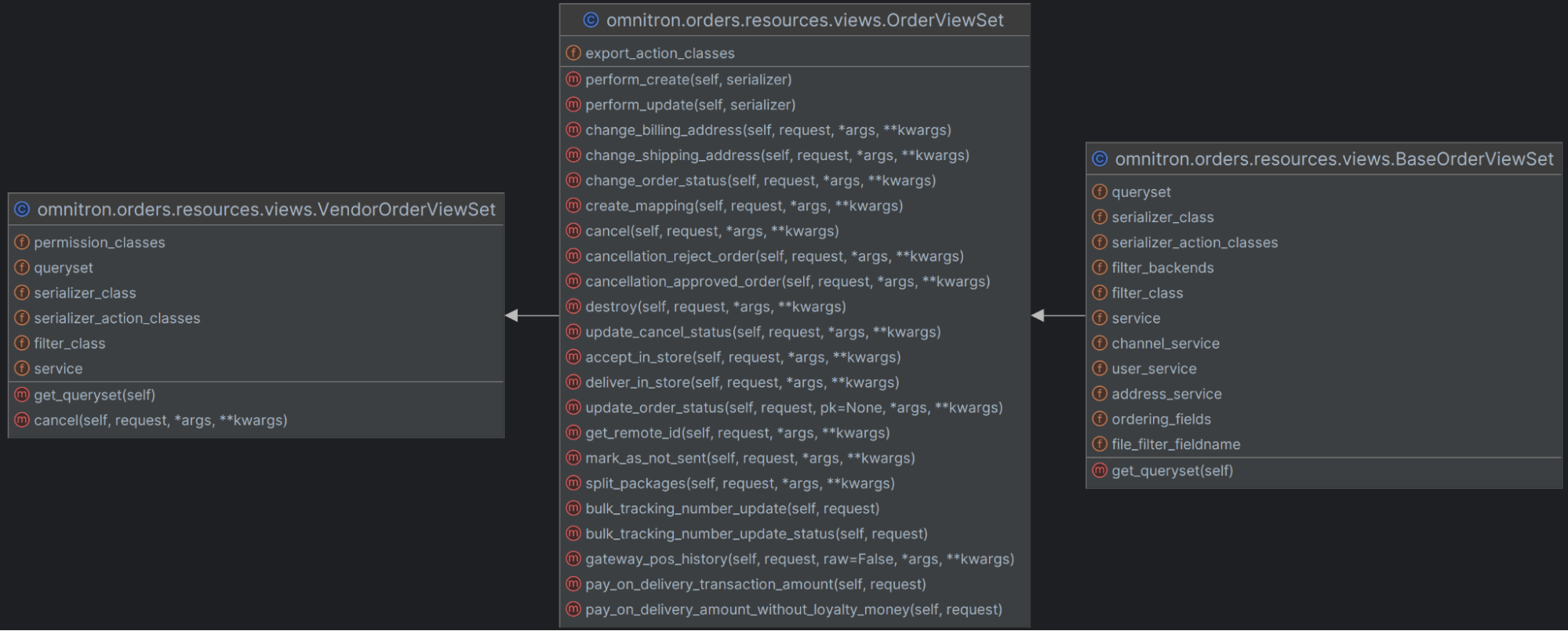
Figure 8: VendorOrderViewSet Structure
omnitron.orders.resources.views.VendorOrderItemViewSet
In this class, it has been inherited from OrderItemViewSet.
get_queryset: The data source has been filtered and returned through the orders with the token in the request and the token in the datasource
perform_update: Overridden so that the serialized data is sent to
omnitron.orders.service.VendorOrderItemService.update_order_item_with_basemethod.bulk_update: Overridden so that the request data is sent to
omnitron.orders.service.VendorOrderItemService.bulk_update_order_itemmethod.

Figure 9: VendorOrderItemViewSet Structure
Serializers
omnitron.orders.resources.serializers.VendorOrderSerializer
Inherited from OrderSerializer.
omnitron.orders.resources.serializers.VendorOrderCreateSerializer
Inherited from OrderSerializer, with validate method overridden. Here, discount_amount, amount and installment_interest_amount’s orderitems linked to the vendor order were fetched as and filled in as attrs.
omnitron.orders.resources.serializers.VendorOrderItemSerializer
Inherited from BaseOrderItemSerializer.